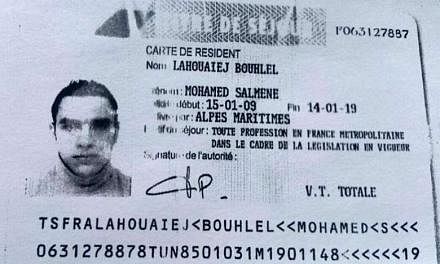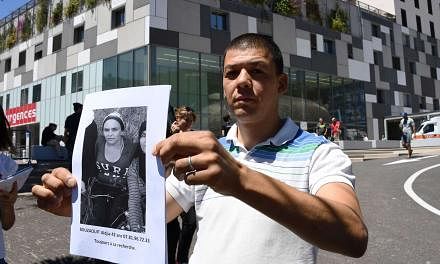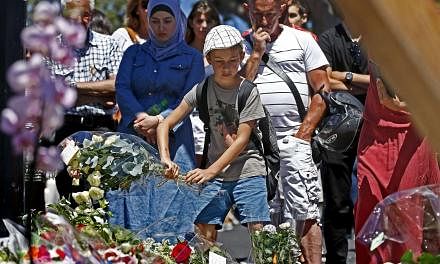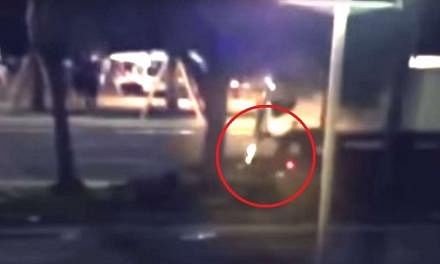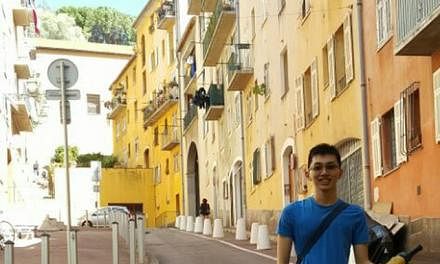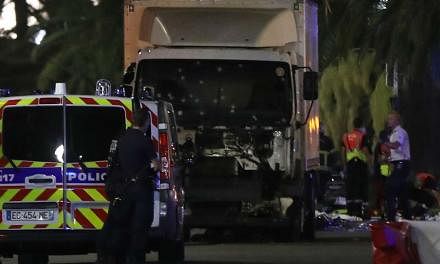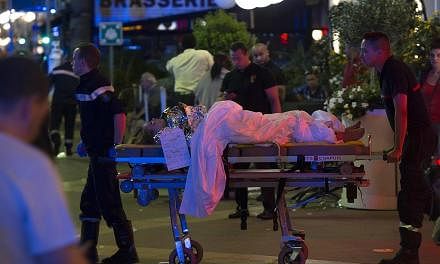NICE, France (AFP) - Mohamed Lahouaiej-Bouhlel was a petty criminal prone to depression and violence who smoked, drank and never went to the mosque, according to neighbours and family.
The Tunisian delivery driver, who on Thursday evening smashed a 19-tonne lorry into a crowd killing 84 people, including 10 children, had shown no overt signs of radicalistaion.
The Islamic State in Iraq and Syria (ISIS) group, in claiming the attack on Saturday (July 16), said he was a "soldier" who had responded to "calls to target nations of coalition states that are fighting (ISIS)".
But authorities said he had not been flagged for links to radical Islamic ideology.
The 31-year-old "seemed to have been radicalised very quickly from what his friends and family" have told police, French Interior Minister Bernard Cazeneuve said on Saturday.
Speaking outside his home in Msaken, eastern Tunisia, the attacker's father said he had suffered from depression and had "no links" to religion.
"From 2002 to 2004, he had problems that caused a nervous breakdown. He would become angry and he shouted... he would break anything he saw in front of him," Mohamed Mondher Lahouaiej-Bouhlel said.
"We are also shocked," he said, adding that he had not seen his son since he left for France but was not entirely sure when this was.
"He didn't pray, he didn't fast, he drank alcohol," his father said. "He even took drugs."
After Thursday's attack on people who had just enjoyed a Bastille Day fireworks display on Nice seafront, his neighbours in a working-class neighbourhood of the city told AFP they had little to do with him.
They portrayed him as a solitary figure who rarely spoke and did not return greetings when their paths crossed.
One neighbour in his four-storey block said she had concerns about him, describing him as "a good-looking man who kept giving my two daughters the eye".
However, another said she had become friendly with him after they struck up a conversation one day in the stairwell when he was looking to buy some cigarettes.
According to her, he was teetotal and refused to drink a glass of wine with her, saying: "No, I don't drink."
The woman, who spoke on condition of anonymity, also said he asked to rent her letter box from her.
"I don't know why. I found it strange, quite frankly," she said, adding that she turned down his request.
Lahouaiej-Bouhlel was often seen drinking beer and never attended the small mosque near his home, other residents of his home district told AFP.
"I never saw him at the mosque," said the caretaker of an apartment building as he sat in a restaurant next to the mosque. He asked not to be named. Three men with him agreed - they had never seen the man at the mosque either.
Anti-terror prosecutor Francois Molins said that although Lahouaiej-Bouhlel had never been investigated by the security services, he was known to police.
He got a six-month suspended jail sentence in March over a violent confrontation after a car accident in January.
"He had a police and judicial record for threats, violence, theft and acts of criminal damage between 2010 and 2016.
"On the other hand, he was totally unknown to intelligence services, nationally and locally, and was never flagged for signs of radicalisation," Molins added.
Lahouaiej-Bouhlel's wife was brought in for questioning on Friday morning, Molins said. Four others were taken in for interviews overnight Saturday.
Neighbours said the couple had three children, including a baby, but were separated.
One resident of the apartment block where the family had lived until 18 months ago, before they split up, said
Lahouaiej-Bouhlel was a violent man who had an extreme reaction to his wife's request for a divorce.
"His wife had asked for a divorce after a violent argument," said the man, who also asked not to be identified.
"He defecated everywhere, he cut up his daughter's teddy bear and slashed the mattress.
"I don't think there was a radicalisation issue, I think there was a psychiatric problem," he added.




